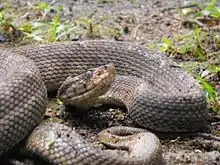Saint Lucia lancehead
The Saint Lucia lancehead or Saint Lucia pit viper (Bothrops caribbaeus) is an endangered species of pit viper endemic to the island of Saint Lucia in the Lesser Antilles.[2]
| Saint Lucia lancehead | |
|---|---|
 | |
| Scientific classification | |
| Domain: | Eukaryota |
| Kingdom: | Animalia |
| Phylum: | Chordata |
| Class: | Reptilia |
| Order: | Squamata |
| Suborder: | Serpentes |
| Family: | Viperidae |
| Genus: | Bothrops |
| Species: | B. caribbaeus |
| Binomial name | |
| Bothrops caribbaeus (Garman, 1887) | |
| Synonyms | |
Description
The Saint Lucia lancehead can reach a total length in excess of 1.3 m (4.3 ft).[2] It is gray to gray-brown, with an irregular temporal stripe, and gray or brown markings that are distinct mid-dorsally and fade towards its sides.[2]
Distribution and habitat
It is found only on Saint Lucia.[2] Along with Bothrops lanceolatus and B. atrox, it is one of three Bothrops species found in the Caribbean. The snake is threatened and today limited to two areas of the island.[3] The only location outside of St. Lucia where these snakes are kept is the Kentucky Reptile Zoo.[4]
Venom
Accidents with this pit viper are extremely rare, with only one report. The victim had local pain and edema, and after a week had developed left facial hemiplegia with facial paralysis and local bleeding, extensive swelling, edema in the abdomen and chest, necrosis and cerebral ischemia.[5]
References
- Daltry, J.C.; Powell, R. (2019). "Bothrops caribbaeus". IUCN Red List of Threatened Species. 2019: e.T50956889A50956898. doi:10.2305/IUCN.UK.2019-2.RLTS.T50956889A50956898.en. Retrieved 18 November 2021.
- Malhotra, Anita; Thorpe, Roger S. (1999), Reptiles & Amphibians of the Eastern Caribbean, Macmillan Education Ltd., pp. 95–96, ISBN 0-333-69141-5.
- "Saving the snakes of St Lucia", The Guardian Weekly, February 5, 2012, retrieved February 17, 2012.
- "Kentucky Reptile Zoo breeds rare island viper".
- Luna, K. P. O.; da Silva, M. B.; Pereira, V. R. A. (2011). "Clinical and immunological aspects of envenomations by Bothrops snakes". Journal of Venomous Animals and Toxins Including Tropical Diseases. 17 (2): 130–141. doi:10.1590/S1678-91992011000200003. ISSN 1678-9199.
Further reading
- Garman, S. 1887. On West Indian Reptiles in the Museum of Comparative Zoölogy, at Cambridge, Mass.
Proc. American Philos. Soc. Philadelphia 24: 278–286. ("Trigonocephalus caribbæus, sp n.", p. 285.) - Breach, K. (2009). Quantifying the Interactions Between Humans and Endemic Pit vipers (Bothrops caribbaeus) in Saint Lucia (MSc thesis, Imperial College London). http://www.iccs.org.uk/wp-content/thesis/consci/2009/Breach.docx
